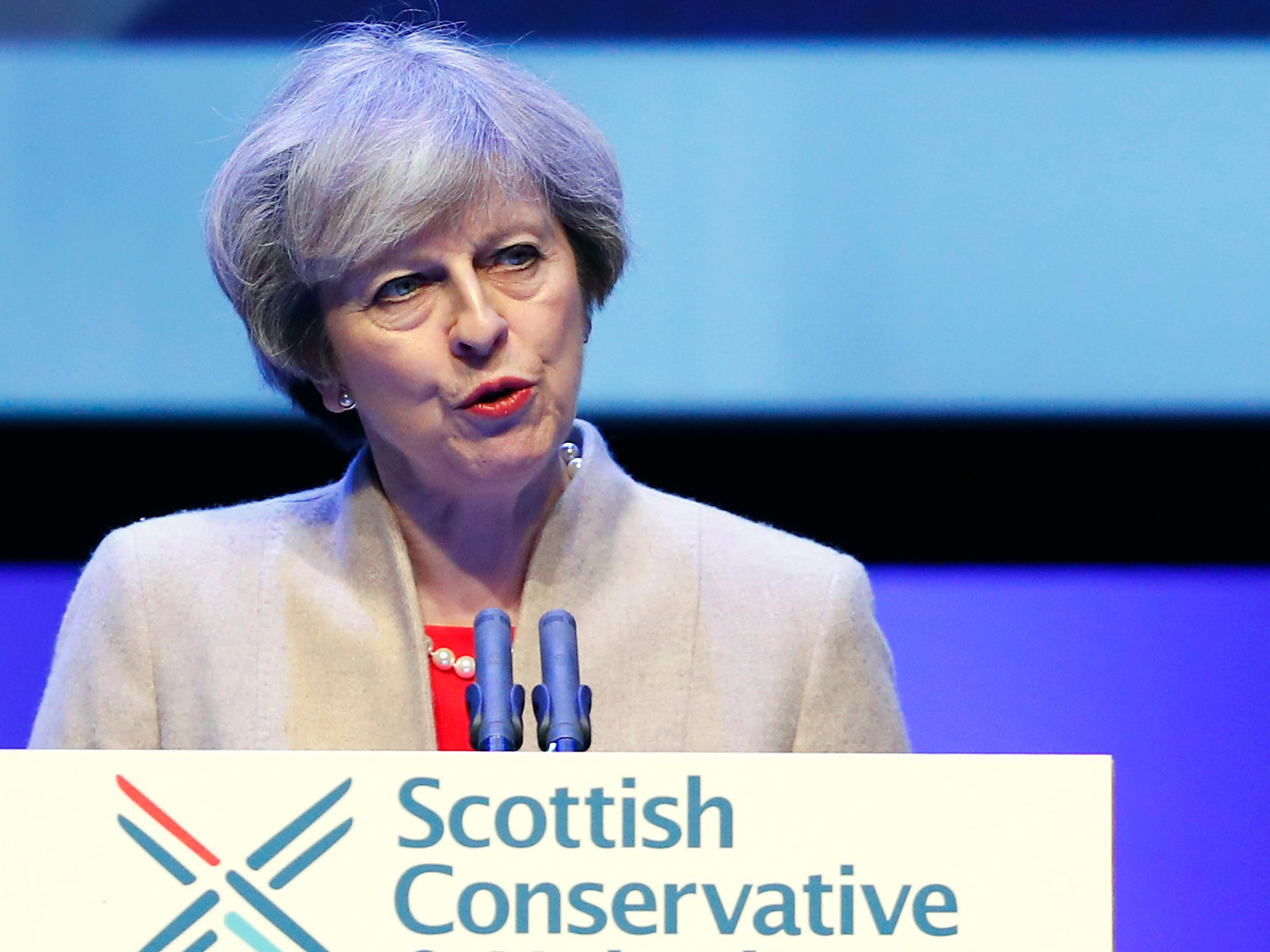Take it from someone who worked on the first Scottish referendum: what Theresa May is doing is a big mistake
The Prime Minister said that, ‘now is not the time’ for a referendum. This will only begin the irresistible demands for her to say when the time is right

Theresa May could not conceivably have waited any longer to respond to Nicola Sturgeon’s ambush on Monday. After the triggering of Article 50 was talked up and then coincidentally delayed till late March, it appeared increasingly as if the Government was snared by Sturgeon’s trap. All she could manage was a spectacularly cognitively dissonant demand that Sturgeon “not play games”, several hours before refusing to rule out using EU nationals resident in the UK as bargaining chips. The suggestion of confusion was not helped by David Davis’ revelation to the parliamentary select committee that they had not carried out any due diligence on the costs of a Hard Brexit. This afternoon Theresa May attempted to re-impose order on a shambolic week only – cushioned by Corbyn’s Scrappy-doo level performance at PMQ’s – by making the boldest move of her premiership thus far. It will also be fatal.
By refusing to permit a Scottish Referendum in defiance of the SNP-Green mandate she has handed over a grievance juggernaut which will be deployed to smash support for the Union until inevitably, a referendum is eventually held.
Since the 1980s the leadership of the Conservative party has done more to imperil the Union than perhaps even the SNP itself. From the brutal abandonment of industrial Scotland by Thatcher and the imposition of the hammer-like Poll Tax to Cameron’s arch, clumsy attempt to put Conservative party politics before statesmanship by tying EVIL (English Votes for English Laws) to further devolution the day after the Independence poll in 2014. Yes, Theresa May stands in a long inglorious line of Tory politicians with no nose for the winds of Scottish politics.
In part, this decision may be influenced by Ruth “Official Opposition” Davidson’s strategy to consolidate unionist votes behind the Scottish Tories and leave Scottish Labour adrift, condemned with its actually rather nuanced and thoughtful position on federalism, to be only ever Diet Unionism or alternatively, Independence Light.
Theresa May had three routes to save the Union, all risky to be sure. She could have continued in the spirit of U-turning to uphold the Tory Manifesto and reverse her Lancaster House outright rejection of the Single Market and face down her Right flank. The Tory backbench NICs revolt showed however that she is no freer of their strong-arming tactics than her predecessor.
Another option was laid open: to call the SNP bluff and announce a snap referendum within six months. So be sure it would have been nasty, brutish and short, but crucially would have wrested control from the SNP in an assertive confident show of strength. Polls show a slim Unionist majority, and the uncertainty of Brexit could have helped pushed voters into sticking with what they know. For now the financial argument against independence is stronger even than in 2014. The SNP canards of a bountiful oil-funded future have dried and withered; the Scottish deficit reflecting its high public spending is over 9 per cent and well above the EU’s required 3 per cent to satisfy its Growth and Stability Pact would require brutal cuts to become an EU member. A swift campaign would have denied the SNP the crucial time they had in 2012/4 to build up a rolling momentum.
Instead, Theresa May has opted for what might appear the most cautious of her sparse options, but this is a mirage. It is in fact a disastrous miscalculation which I believe may cost the Union. She has chosen to delay the referendum saying “now is not the time”, refusing to even offer her own timetable, but indicating at least until after Brexit negotiations conclude. She is betting on polls which show that most Scots believe it is too early for yet another plebiscite. It is true that the electorate feel that having had a perfectly delicious slice of democracy in 2014. However, the SNP and Green Parties command a working majority in the Scottish Parliament. If a vote is held and an arch Prime Minister is seen as more concerned with ripping the Scotland out of a Union it voted by 60 per cent to remain a part of than in paying defence to their elected parliament, it will not go well for The Unionist cause. Sturgeon has shown herself adept at exploiting minor knife-like grievances, like devolution of agriculture powers form the EU, but this hands her a claymore.
However popular Ruth Davidson is personally, it should be noted that the Scottish Conservatives are further behind the SNP in opinion polls than Corbyn’s Labour are behind the Tories nationally. The toxicity of the Tory brand in Scotland remains noxious – indeed Labour’s collapse is in part down to a perception among some that their collaboration with the Tories in the Better Together campaign marked a betrayal of their beliefs.
Perhaps, worst of all about the formulation Theresa May chose, is that it is completely unsustainable. “Now is not the time” will only begin the furious and ultimately irresistible demands for Theresa May to say when is the time? If it is to be after the referendum, when the UK and Scotland has left, this will only add napalm to the fire of grievance Sturgeon will try and muster – for this will have to remove the tangible rights of EU citizenship which Scots voted to save. A dominating theme of the 2014 referendum was the notion that by voting No, Scotland would remain in the EU, but by voting Yes it could find itself having to endure a costly re-entry process. When precisely the opposite happens, delaying a referendum would only delay the inevitable, in the words of Burns, May would find a Scotland in 2021 “nursing its wrath to keep it warm”.
It may even be that by failing to resolve the Scottish question until far later that she weakens her own position in Brexit negations. As shrewd EU negotiators will have noticed the option of offering Scotland a relatively frictionless (to borrow a term) re-entry into the EU, perhaps with a transitional deal for satisfying its deficit conditions, would be a powerful ace against an increasingly internally divided UK.
Theresa May feels she must be seen to act decisively against SNP agitation, but if a Tory PM is seen to block a majority vote in the Scottish Parliament, let me tell you, in the battle of public opinion for the Union there will only be one winner.
John McKee worked on the Better Together campaign


Join our commenting forum
Join thought-provoking conversations, follow other Independent readers and see their replies